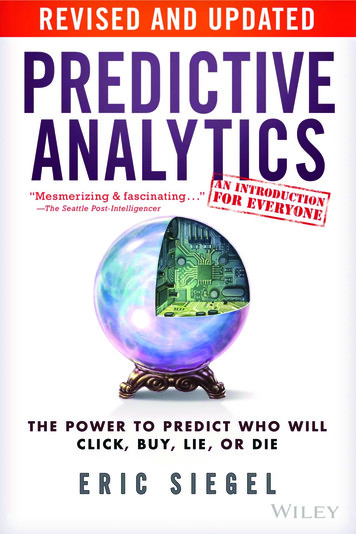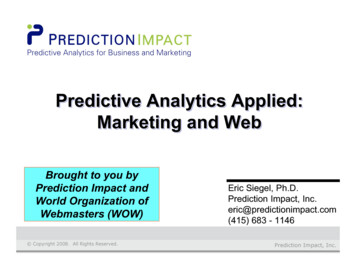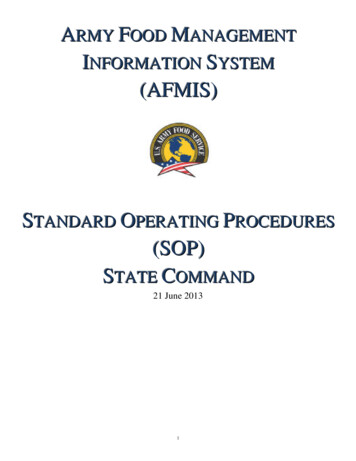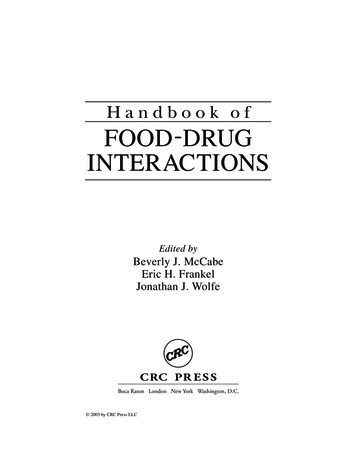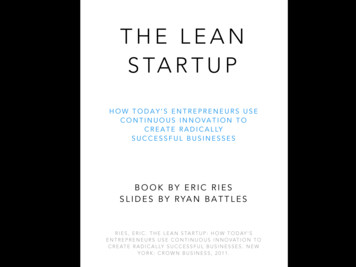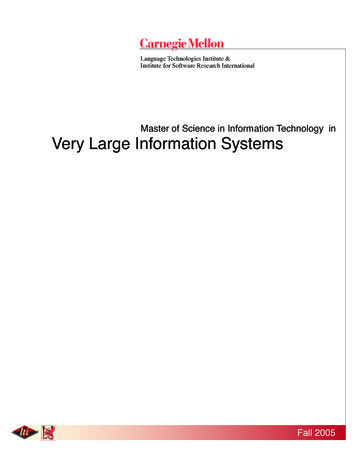
Transcription
DOCUMENT RESUMEHE 015 429ED 223 123AUTHORTITLEINSTITUTIONPUB DATENOTEYoung, David J.; Tigges, Steven W.Federal Tuition Tax Credits and the EstablishmentClause: A Constitutional Analysis of thePackwood-Moynihan Proposal.National Catholic Educational Association,Washington, D.C.Jan 8243p.; Prepared at Murphy, Young & Smith, Columbus,OH.AVAILABLE FROMPUB TYPEEDRS PRICEDESCRIPTORSIDENTIFIERSABSTRACTNational Catholic Educational Association, 1077 30thStreet, N.W., Suite 100, Washington, DC 20007.Viewpoints (120) -- Legal/Legislative/RegulatoryMaterials (090) -- Information Analyses (070)MF01/PCO2 Plus Postage.Church Related Colleges; Constitutional Law;Educational Opportunities; Federal Government;*Federal Legislation; Higher Education; ParentFinancial Contribution; Private Colleges; *PrivateSchools; *Religion; *State Church Separation; *TaxCredits; *Tuition*First Amendment; Moynihan (Daniel P); Packwood(Robert W); Tuition Tax Credits Legislation; UnitedStates ConstitutionlkA constitutional analysis is presented of theEstablishment Clause of the First Amendment of Senate Bill 550, thePackwood-Moynihan proposal for federal tuition tax credits forparents who pay tuition in order to send their children to anonpublic school. The Supreme Court has developed a three-partstandard under the Establishment Clause: the legislation must have asecular purpose and a secular effect and it must not create excessiveentanglements between government and religion. With respect to thesecular purpoqe requirement, the articulated purpose of thePackwood-Moynihan proposal-is to promote educational (not religious)pluralism and to enhance educational opportunity for all Americans attheir chosen schools. The entanglements test has two concerns:whether legislation creates undue administrative involvements betweenchurch and state; and whether it fosters serious politicaldivisiveness or fragmentation along religious lines. It is suggestedthat whereas the secular purpose and entanglements tests should notthreaten the validity of federal tuition tax credits, the seculareffect requirement presents a more difficult.question. Attention isdirected to the Committee for Public Education v. Nyquist decision,which invalidated New York's tuition tax benefit program. Among thearguments favoring the bill are the following: the proposal wouldgrant assistance to individuals, not institutions; it proposednational tax legislation in line with the power of Congress to taxand spend; aid can be viewed as going to nonideological secularfunctions of church-related schools; and the legislation might helpreserve freedom of educational choice which the Supreme Court hasheld is constitutionally protected. The text of the bill is appended.(SW)
FEDERAL TUITION TAX CREDITS AND THEESTABLISHMENT CLAUSE:CONSTITUTIONALANALYSIS OFATHE PACKWOOD-MOYNIHAN PROPOSALTHE NATIONAL CATHOLIC EDUCATIONAL ASSOCIATIONSuite 350One Dupont CircleWashington, D.C. 20036"PERMISSIONMATERIALTO REPRODUCEHAs BEEN GRANTEDTHISSYTO THE EOUCAT/ONALFIESOURCESINFORMATIONCENTER (ERIC)."Prepared by:David J. YoungSteven W. TiggesMURPHEY, YOUNG & SMITHA Legal Professional Association250 East Broad StreetOF EDUCATIONU.S. DEPARTMENTOF EDUCATIQNNATIONAL INSTITUTEINFORMATIONEDUCATIONAL RESOURCESCENTER (EPIC)been reproduced ashis document hasorganizatiolreceived from the person or43215,,originating it.have been made to improveLI Minor changesreproduction quality.January 1982opinions stated in this docuPoints of view orofficial NIEnecesurilyrepresentment do notposition or policy.2
TJTABLE OF CONTENTSPageSummaryDiscussionIntroductionAn Overview Of Senate Bill 550Contemporary Standards Of Establishment Glause AnalysisIII.Tuition Tax Benefit Legislation And Judicial Attitudes UnderIV.The Establishment Clause: The Nyquist DecisionFederal Tuition Tax Credits And TheV.Secular Purpose ElementFederal Tuition Tax Credits And TheVI,Secular Effect ElementA. The Shifting Meaning Of Secular Effect AndContinued Viability Of Nyquist1, The Traditional Meaning Of Secular Effect2. Secular Effect In Transition: The Nyquist"No Aid" Standard3. Nyquist Applied: The MinnesotaAnd Meek Decisions4. Rejection Of the Nyquist-Meek "No Aid" Standard:The Wolman And Regan Decisions5. Regan, Wo !man, And The ContinuedViability of NyquistB. Traditional Measures Of Secular Effect1. Separability And Breadth2. Separability And The Child Benefit Doctrine3. Separability And Allocation Of Aid ToSecular Functions4. Separabi* And Affirmative Government Assistance5. Breadth, National Legislation, And GenuineTax Benefit Programsa. National Legislationb. Nyquist Footnote 38 And The Blanton Decisionc. Legislative Precedent For Federal TuitionTax CreditsC. Alternative Bases For Finding Secular Effect1. Federal Tuition Tax Credits AndPreferential Treatment2. Federal Tuition Tax Credits AndPreserving Freedom Of ChoiceD. Concluding Comments: Federal Tuition Tax CreditsAnd The Secular Effect TestFederal Tuition lex Credits And Excessive EntanglementsVII,VIII. ConclusionAppendix Senate Bill 3637
FEDERAL TUITION TAX CREDITS AND THE ESTABLISHMENT CLAUSE:A CONSTITUTIONAL ANALYSIS OF THE PACKWOOD-MOYNIHAN PROPOSALSUMMARYThis memorandum addresses the constitutionality under the EstablishmentClause of the First Amendment of Senate Bill 550, the Packwood-Moynihan proposal for federal tuition tax:credits for parents who pay tuition in order to sendtheir children to a nonpublic school.Tuition tax benefit programs such as the Packwood-Moynihan proposal areAmericanone of the many current legislative attempts to ease a growing crisis inOnfirettedchoicetodirect theeducation, and to protect parents' constitutionallyeducation of their children by enrolling them in a nonpublic school. Becausemany (if not most) nonpublic schools in this country are church-affiliated, however, tuition tax benefit legislation invariably raises questions concerning thevalidity of such programs under the constitutional command that government-shall make no law respecting an establishment of religion."Perhaps no issue in constitutional law is more difficult to resolve than the question whether and when the national legislature can offer assistance to nonpubliceducation. The Supreme Court itself has admitted that many of its deciiiOns inthis area contain no logical or principled rationale. Indeed, the courts which haveconfronted (state) tuition tax benefit legislation have predictably displayed theuncertainty which characterizes the issue: five courts have found such legislationto be unconstitutional, whereas two others have perceived no constitutional deficiencies.Certain general concepts are settled, hoWever. It is clear that whether federaltuition tax credit legislation would comport with the constitutional proscription ofgovernment "aid" to religion must be resolved in light of the three-part standardwhich the Supreme Court has developed under the Establtshment Clause: thelegislation must have a "secular purpose"; it must also have a "secular effect"; andfinally, it must not create "excessive entanglements" between government andreligion.Neither the first nor the last of these tests should pose any threat to the constitutionality of Senate Bill 550.With respect to the "secular purpose" requirement, the articulated purpose ofthe Packwdrad-Moynihan proposal is to promote educational (not religious)opportunity for all Ameri, pluralism antrlo enhance the quality of educationalchoice."Asidefrombeingobviously secular, this. of theircans at tfre.Shoolsstated purpbse is virtually identical to what already has been accepted by theSupreme Court as constitutionally permissible.The -entanglements" test has two concerns: whether legislation creates undueadministrative involvements between church and state; and whether it fostersserious political divisiveness or fragmentation along religious lines.The "administrative entanglements" prong of the test is totally inapplicable tofederal tuition tax credit legislation. Put simply, legislation such as Senate Bill550 contains none of the ingredients which traditionally have triggered the administrative entanglements concern.The Packwood-Moynihan proposal also appears to be relatively devoid of political entanglements problems. It admittedly does not involve the serious type ofpolitical-religious confrontaVon to which the political entanglements idea is directed. Moreover, Senate Bill 550 is national legislation which by its very naturedoes not create the special benefits or religious preferences which can lead topolitical -religious dispute. And finally, the Bill proposes a tax measure which, unlike legislative grant programs requiring annual appropriation and funding debates. does not necessitate ongoing legislative oversight capable of leading tofuture religious lobbying.1,.
Whereas the secular purpose and entanglements tests should not threaten thevalidity of federal tuition tax credits, the "secular effect" requirement presents amore difficult question. The courts which have invalidated tuitign tax benefit programs have done so on the basis of the Supreme Court's inOi !WV in Committeefor Public Education v. Nyquist to discern a secular effect in sail legislation. Thecrucial issue for Senate Bill 550 is, therefore, whether it would have a permissible"secular effect."The secular effect test traditionally was a relatively lenient one, requiring onlythat legislation not primarily aid religious interests. Collateral assistance to religious institutions, no matter how obvious, was wholly acceptable. Senate Bill550 would undoubtedly be upheld under the traditional formulation of seculareffect.The Nyquist decision, however, dramatically rewrote the law of secular effect,transforming the test into a total prohibition of any aid of "substance." One notedcommentator has described Nyquist as embodying a "no aid" standard.nyquist is particularly important to Senate Bill 550 because in that case theCourt invalidated New York's tuition tax benefit program. Although the legislationconfronted in Nyquist is easily distinguishable from the Packwood-Moynihanproposal. Nyquist's broad transformation of the meaning of secular effect hasdiredt implications for all legislation assisting parents of nonpublic school studehts, including tuition tax benefits. Indeed, one post-Nyquist court noted thatthe tuition tax benefit program before it would have been upheld but for thechanges in the secular effect test accomplished by Nyquist.Careful reading of the decisions since Nyquist, however, leads to only one conclusion: the Supreme Court has backed away from the Nyquist "no aid" formula ofsecular effect and now is applying a "more flexible concept" resembling thatwhich was found in the pre-Nyquist cases. Particularly instructive in this regardare the 1977 decision in Wolman v. Walter and the 1980decision in Committee forPublic Education v. Regan.The result reached in Nyquistinvalidation of New York's tuition tax benefitplan was a direct consequence of the "no aid" standard adopted in that case.Since that standard is no longer being followed, Nyquist must be considered ashaving reduced precedential value for future tuition tax benefit legislation, andparticularly for the Packwood-Moynihan proposal. Whether Senate Bill 550would have a permissible "secular effect" cannot be resolved merely by citation toNyquist. Instead, that question must be answered in light of the factors whichtraditionally have been determinative of secular effect.First. the Bill proposes national tax legislation pursuant to the constitutionallyenumerated power of Congress to tax and spend. The tax credits contemplatedby the Bill would accrue to the benefit of a broad class of persons nationwide.National legislation having such origins and effects is remarkably different fromcomparable state legislation. It contains an inherent assurance that impermissible considerations and effects are not present. There is abundant legislativeprecedent. both in the Internal Revenue Code and elsewhere, supporting federaltuition tax credits.Second. the Packwood-Moynihan proposal would grant assistance to individuals, not to the institutions (religious or otherwise) which those individuals mayhappen to attend. Cases such as Board of Education v. Allen and Everson V. Boardof Education support the proposition that such disbursement of aid to individualsrather than institutions is constitutionally permissible.Third, even if Senate Bill 550 is considered to provide aid to church-relatedschools. such aid can be seen as going merely to the separable and nonideological secular functions of those schools. In the Regan case and in Tilton v. Richardson and Hunt v. McNair, the Supreme Court held that such non ideological assistance does not contravene the secular effect test.Fourth, a tax credit does not involve affirmative governmental assistance but52
the Courtis more in the nature of exemptive action. In Walz v. Tax Commissionand estabwas adamant that there is "no genuine nexus between tax exemptionlishment of religion."Fifth, there can be little doubt that Senate Bill 550 comports with the "originalby theunderstanding" of the First Amendment and the values eFramers in that Amendment. Courts arefashionratified by the-people and hence embedded in the Constitution, not totheir own values into the cloth of constitutional law.byFinally, federal tuition tax credit legislation would be merely an attemptSupremeofeducationalchoicewhichtheCongress to preserve the freedomwouldCourt has held is constitutionally protected. In this sense, Senate Bill 550 them.rightsratherthantransgressinghave the effect of upholding constitutionalPackwood-Each of these factors taken individually favors the contention that theMoynihan proposal would have a valid Secular effect. When considered cumuladetive,/, and in light of the suspect precedential value of Nyquist, they virtuallyfo
550 would undoubtedly be upheld under the traditional formulation of secular. effect. The Nyquist decision, however, dramatically rewrote the law of secular effect, transforming the test into a total prohibition of any aid of "substance." One noted. commentator has described Nyquist as embodying a
